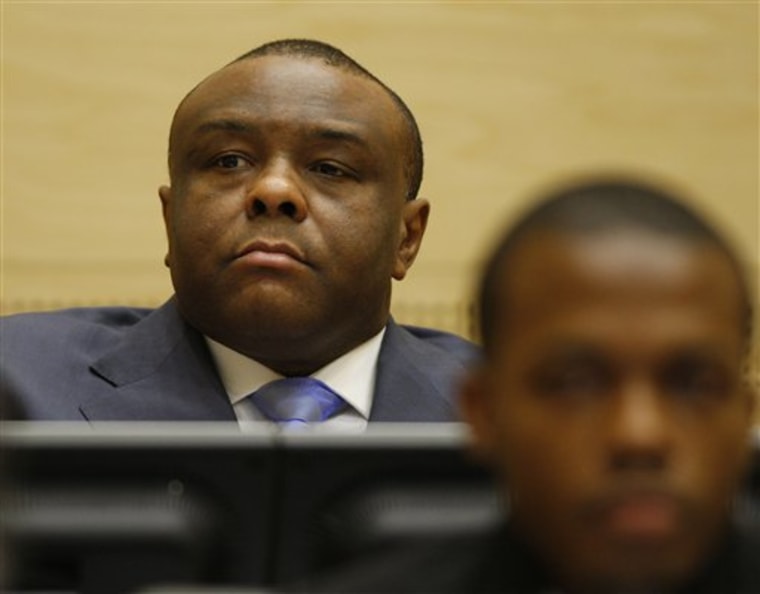Militias under the command of a former Congolese vice president rampaged through Central Africa Republic raping hundreds of women and men, war crimes prosecutors alleged Monday. But the defense argued Jean-Pierre Bemba sent the troops to rescue an embattled neighbor, and was not responsible for their actions once they crossed the border.
The International Criminal Court began four days of hearings to determine whether prosecutors have a substantial case to put Bemba on trial on eight counts of murder, torture and mass rape during the civil war in 2002-2003.
The three-judge panel has 60 days to decide whether to commit him to trial, seek more evidence or let him go.
Bemba, 46, is the most senior political figure to be brought before the world's first permanent war crimes tribunal since it began work in 2002. The court also has issued an arrest warrant for Sudan's president, Omar al-Bashir, on genocide charges in Darfur, but he has refused to surrender.
Horrific campaign described
Prosecutors described a horrific five-month campaign by two battalions of Bemba's militia, the Movement for the Liberation of Congo, starting in October 2002. Central Africa Republic President Ange-Felix Patasse had appealed to Bemba for help to fend off a coup led by his former army chief of staff, Francois Bozize, who is now president.
"Bemba wanted to traumatize and terrorize the civilian population so they would not support the rebels," deputy prosecutor Fatou Bensouda said in an opening statement. "He chose rape as his method."
She cited one unidentified witness, a government official in the capital Bangui, who said three of Bemba's men burst into his home firing their weapons, forced him to his knees as his family watched, then sodomized him for four hours. "In front of my eyes they abused my wife," she quoted the witness as saying. "After they finished with my wife, they came for my kids."
Bensouda said rape was widespread and "part of the systematic attack on the civilian population."
But defense attorney Karim Khan quoted other witnesses as saying Bemba was upset when he learned of such actions, and ordered one or two of his commanders to return to Congo as a result. Life improved after he visited his troops, Khan quoted the witnesses as saying.
He read a letter Bemba wrote to a senior U.N. official in January 2003 appealing for help to investigate allegations of misconduct that could be used in courts martial, but the defense attorney said the U.N. response was "deficient."
Human rights organizations said Bemba put some of his officers on trial, but they were widely regarded as a sham.
Khan tried to shift the responsibility for atrocities onto Patasse, and said Bemba had no command of the militia once they crossed the Oubangui River into Patasse's country. He compared the intervention to the deployment of United Nations troops, which are no longer under the control of their home armies once they don blue helmets.
Civilians 'left with nothing'
Prosecutor Petra Kneuer said Bemba's militia continued raping and looting even as they were withdrawing when it was clear Patasse had lost power. "After they left, the civilian population was left with nothing: no possessions, no community, no dignity," Kneuer said.
Patasse, who fled into exile in Togo after he was overthrown, was mentioned as a co-conspirator in all the charges, but he has not been publicly indicted. He was reported to have returned last week to Bangui to participate in political contacts with the government's permission.
Richard Dicker, of Human Rights Watch, urged the prosecutors in The Hague to expand the charges to include civilian or military officials of Central Africa Republic. "Bemba does indeed have something to answer for, but other suspects are conspicuous by their absence," he said from New York.
Bemba was arrested last May in Belgium and extradited to The Hague in July. He also kept a house in Portugal.
A university graduate and former chief executive of several companies, Bemba ruled a vast chunk of northeastern Congo's border with the Central Africa Republic as a warlord and rebel leader during that Congo's 1998-2002 war. As part of a peace agreement, he became one of four vice presidents in a transition government that paved the way for elections in 2006.
Bemba came in second in the heated presidential race, behind Joseph Kabila. He was elected a senator, but refused to dismantle his militia, leading to clashes with security forces that left at least 300 dead in March 2007. Facing charges of treason, he fled into exile in Portugal and Belgium.
